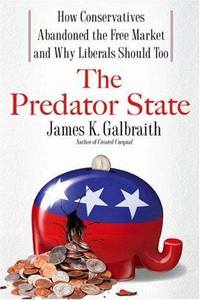

Purchase
How Conservatives Abandoned the Free Market and Why Liberals Should Too
Free Press
August 2008
On Sale: August 5, 2008
240 pages
ISBN: 141656683X
EAN: 9781416566830
Hardcover
Add to Wish List
Non-Fiction Political
The cult of the free market has dominated economic
policy-talk since the Reagan revolution of nearly thirty
years ago. Tax cuts and small government, monetarism,
balanced budgets, deregulation, and free trade are the core
elements of this dogma, a dogma so successful that even many
liberals accept it. But a funny thing happened on the bridge
to the twenty-first century. While liberals continue to bow
before the free-market altar, conservatives in the style of
George W. Bush have abandoned it altogether. That is why
principled conservatives -- the Reagan true believers --
long ago abandoned Bush. Enter James K. Galbraith, the
iconoclastic economist. In this riveting book, Galbraith
first dissects the stale remains of Reaganism and shows how
Bush and company had no choice except to dump them into the
trash. He then explores the true nature of the Bush regime:
a "corporate republic," bringing the methods and mentality
of big business to public life; a coalition of lobbies,
doing the bidding of clients in the oil, mining, military,
pharmaceutical, agribusiness, insurance, and media
industries; and a predator state, intent not on reducing
government but rather on diverting public cash into private
hands. In plain English, the Republican Party has been
hijacked by political leaders who long since stopped caring
if reality conformed to their message. Galbraith
follows with an impertinent question: if conservatives no
longer take free markets seriously, why should liberals? Why
keep liberal thought in the straitjacket of pay-as-you-go,
of assigning inflation control to the Federal Reserve, of
attempting to "make markets work"? Why not build a new
economic policy based on what is really happening in this
country? The real economy is not a free-market
economy. It is a complex combination of private and public
institutions, including Social Security, Medicare and
Medicaid, higher education, the housing finance system, and
a vast federal research establishment. The real problems and
challenges -- inequality, climate change, the infrastructure
deficit, the subprime crisis, and the future of the dollar
-- are problems that cannot be solved by incantations about
the market. They will be solved only with planning, with
standards and other policies that transcend and even
transform markets. A timely, provocative work whose
message will endure beyond this election season, The
Predator State will appeal to the broad audience of
thoughtful Americans who wish to understand the forces at
work in our economy and culture and who seek to live in a
nation that is both prosperous and progressive.
Comments
No comments posted.
Registered users may leave comments.
Log in or register now!
| 


 © 2003-2025 off-the-edge.net
all rights reserved Privacy Policy
© 2003-2025 off-the-edge.net
all rights reserved Privacy Policy